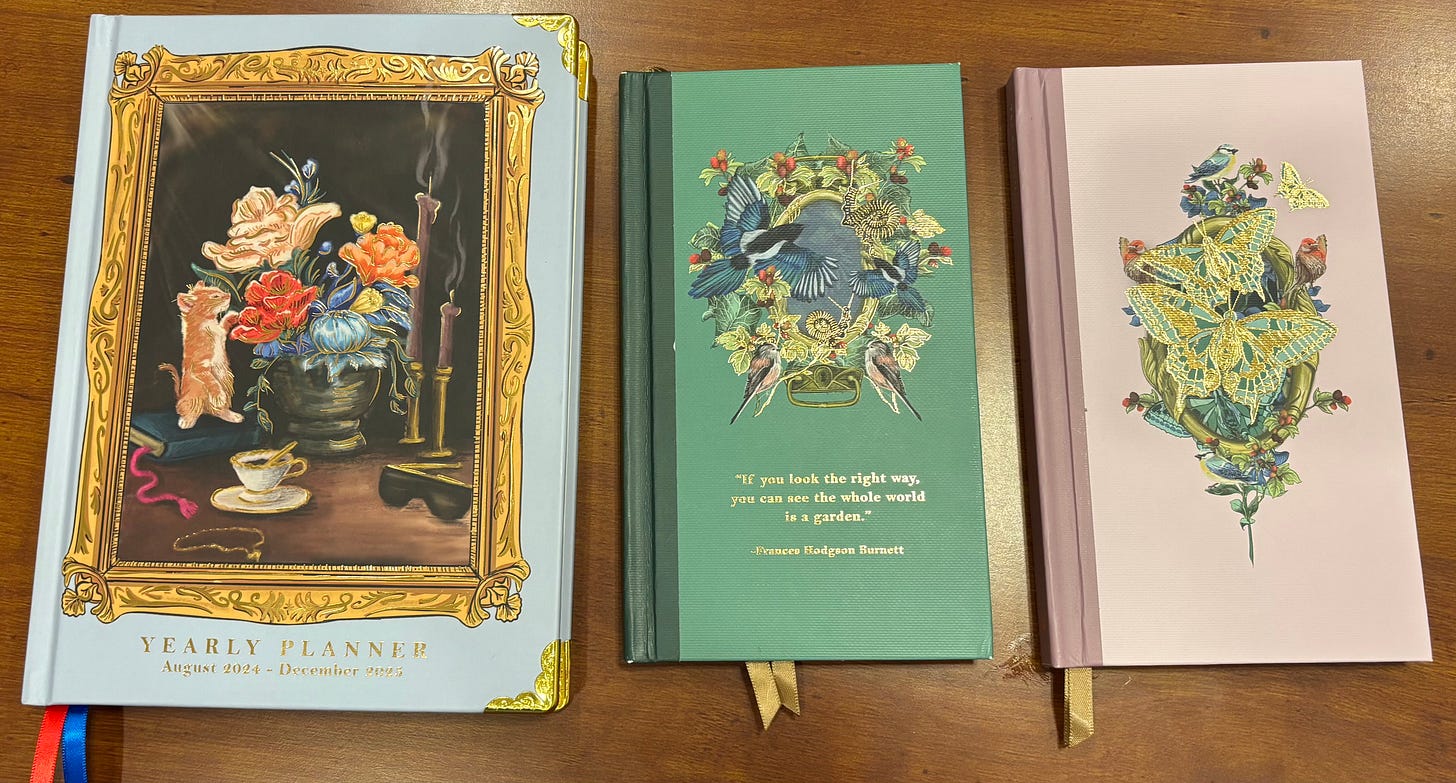Dear friends,
Happy New Year! As 2025 begins, I’m feeling especially grateful for the Write at the Edge community. I’ve loved having the opportunity to share writing tips with you over these past few months, and I’m excited about the posts I have planned for 2025.
The start of a new year is a good time to reflect on how you can carve out more time for writing. I gave this a lot of thought in 2024 and developed some helpful strategies that have led to a reliable writing routine.
I’ve listed 10 related tips below, beginning with a new perk that I’m offering to subscribers in 2025. This will be the first of a few subscriber perks that I’ll roll out in the new year.
1.) Find a writing community. I belong to a few different writing communities, including a local author’s group in Austin and a small virtual group of freelance writers whom I meet with via Zoom each week. Though different in scope, these groups offer a similar benefit: they make the writing process feel less solitary and more communal. I want to offer you something similar, so I’ve launched a group chat feature that will serve as a private writing community for Write at the Edge’s paid subscribers. I’ll post questions and updates, and you can jump into the discussion whenever you’d like. I’ll also offer opportunities to ask me questions and get advice on writing, editing, book publishing, etc. To access the chat, become a paid subscriber for $50/year or $5/a month. I would love for you to consider subscribing, if it’s within your means. (For those of you who already subscribe, thank you so much!)
2.) Start writing, without waiting for the perfect conditions. I’ve talked with many people throughout the years who say they want to write a book but have nothing to show for it. Sometimes this happens because we’re waiting for the “ideal time” to start writing — e.g. once we transition into a new job, or once our kids are older and out of the house. Whether we want to admit it or not, the quest to find the ideal time is typically a form of procrastination. This month, just start. If you realize next month that you stopped, begin again. As the nineteenth-century author Johann Wolfgang von Goethe once said: “Whatever you think you can do or believe you can do, begin it. Action has magic, grace and power in it.”
3.) Seek more opportunities to write by hand. I’m the type of person who always has two browsers open at all times, with about 30 tabs in each one. Every tab is a temptation that distracts me from my writing. There’s not an easy solution to this problem, but I’ve found a few hacks that help: If you’re writing in a Word document, minimize your browser and maximize the document so that you can focus more exclusively on it; put your phone across the room; consider using a software called Freedom, which lets you block the internet for chunks of time; or write by hand.
The latter works best for me; by disconnecting from digital devices, I can more fully connect with my writing. And there’s something about putting pen to paper that makes me feel more like a writer. It also helps my young kids see me more as a writer.
In 2025, look for more opportunities to write by hand. A simple way to start is to buy a planner, which will force you to write out important appointments, meetings, memories made, etc. The act of maintaining it can get you into the habit of putting pen to paper, and it’s a nice way of documenting both your day-to-day life and important milestones. My debut book will be published later this year, so I bought a planner to track the events leading up to it.

4.) Remember that writing is work. It’s easy to think of writing as an extra-curricular — something you do for fun, if time allows. But if you always think of writing as something “extra,” you’re more likely to push it aside and only make time for it on occasion. Once I started thinking of writing as part of my work, I prioritized it. I began adding “writing time” to my calendar, blocking off an hour or two each day to hone my craft. For me, this meant waking up earlier each day to fit in writing time. For you, it might mean sketching out ideas on the train ride into work, writing during your lunch hour, or forgoing that extra episode of your favorite TV show at night. In 2025, make the necessary adjustments to fit writing into your calendar (or planner)!
5.) Adopt the “max/mod/min” strategy. I learned about this a couple years ago from author Julie Morgenstern, a productivity and organization guru. The max/mod/min strategy helps you to consider: What’s the maximum you could do to perform a task at the highest level? What’s the bare minimum you could do to just get something off your plate? And what’s the in-between, or moderate, option? Morgenstern offers up a great example:
Your child’s birthday falls on a school day and it’s the tradition in your child’s school to bring in a treat for the class. What’s the Max/Mod/Min?
Max: You bake, frost and decorate cupcakes, all from scratch.
Mod: You rely on your friend Betty Crocker, and make cupcakes with store-bought mix.
Min: You buy cupcakes at the grocery store.
As a perfectionist, I naturally gravitate toward maximum mode. But it’s exhausting, especially as a working parent. In recent years, I’ve learned that occasionally choosing the minimum option affords me more writing time. (And as it turns out, my kids don’t really notice the difference between my homemade cupcakes and the local grocery store’s!)
6.) Give yourself grace when you drop a ball. The other day I came across some great advice in the New York Times’ morning newsletter: “We are all juggling so many balls. Differentiate between glass balls and rubber balls — and don’t be afraid to drop the rubber balls.” First off, this quote is a nice example of how to take a cliche and put your own creative twist on it; doing so allows you to move from the voice of many (the cliche) to your original voice as a writer. Second, this quote is especially relevant to writers. In 2025, don’t be hard on yourself if you have to drop a few rubber balls to make more time for writing. If needed, ask for help picking them up. Or let them roll away.

7.) Look at every correspondence as an opportunity to practice writing. As a journalism professor, I encourage my students to think of every email, text, and social media post as an opportunity to practice good writing. I say this not to add to their stress but to relieve it. When you pay attention to how your craft trickles into your daily life, you can begin to see it as more of a focal point than an afterthought. On days when you don’t have time to sit down and work on a writing project, try to practice good writing in other ways. When writing an email, for instance, you might ask yourself: How can I trim this wordy sentence? Or when writing an Instagram caption, consider: How can I try infusing some humor into my description of this family photo? You don’t have to do this with every email or post, but it’s gratifying to know you have the option.
8.) Be a realistic goal-setter. Many New Year’s resolutions taper off, partly because people set too many unrealistic goals. With this in mind, don’t aim to write 1,000 words a day if you’ve hardly written anything in 2024. Lower the barrier to entry and aim to write a paragraph or two a day. Once you get into a routine and want a new challenge, try advancing your goal. Along the way, remember that some days you will write more, and some days you will write less. The goal isn’t to keep doing more and more; it’s to keep on progressing. On days when you can’t write, think about how else you can “touch” your project each day — perhaps by doing a bit of research, zero drafting some ideas, interviewing a source, etc.
9.) Tell a family member or friend what you’re working on. It’s easier to avoid writing if you don’t tell anyone what you’re working on. Sharing your ideas, struggles, and victories with others can hold you accountable and make your writing feel more real. In journalism, we call this front-end editing — talking about a story with your editor before and during the writing process rather than waiting until the end. If you don’t have an editor you can do this with, consult a fellow writer, friend, or family member. I always tell my husband what I’m working on, especially early on when I’m thinking through an idea and want to see whether it has potential. Or, if I’m writing about something complicated, I’ll tell my husband about it to test my knowledge of the subject matter. If I have difficulty describing it, chances are I need to do more reporting. In our new Write at the Edge live chat, subscribers will have weekly opportunities to share what they’re working on in conversation with others.
10.) Read an old piece and start tinkering with it. If you want to start writing more in 2025 but don’t know where to start, try this: Revisit an old piece of writing. It can be a published piece, or a piece that you started writing but never finished. (My 97-year-old grandmother, who’s an artist, calls these UFOs, or UnFinished Objects.) When you’ve found a piece, read it out loud. Pay particular attention to the way your writing voice sounds. Then think about what works well about the piece and what you would change if you were to write it now. You may find that this simple exercise gives you a burst of creativity energy, and/or you may realize that you’ve grown a lot as a writer in the years since. Both reactions are rewarding, and they can help kickstart your writing process. Pick up where you left off, or start anew.
I’d love to hear from you! What tip(s) resonated with you? How do you plan to prioritize writing in the new year?





Great advice!
I'm also a fan of the Freedom app and the less-than-perfect writing conditions approach!